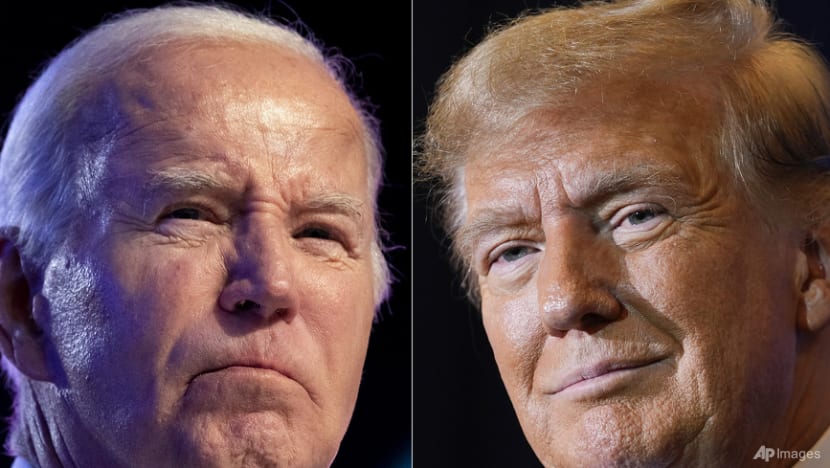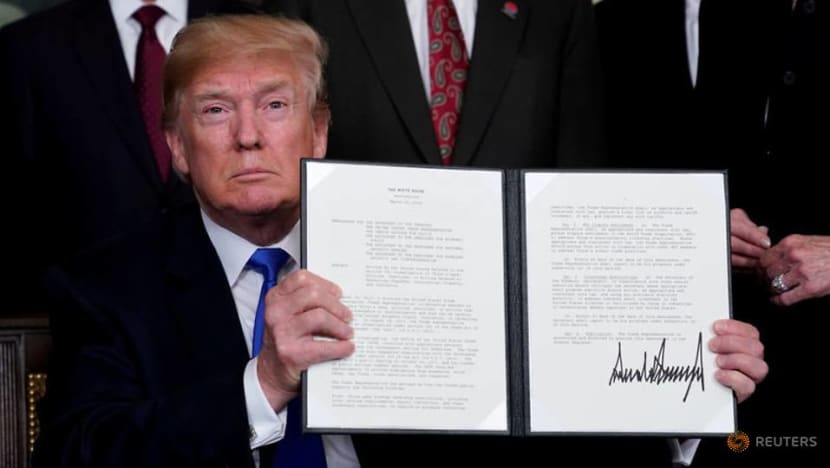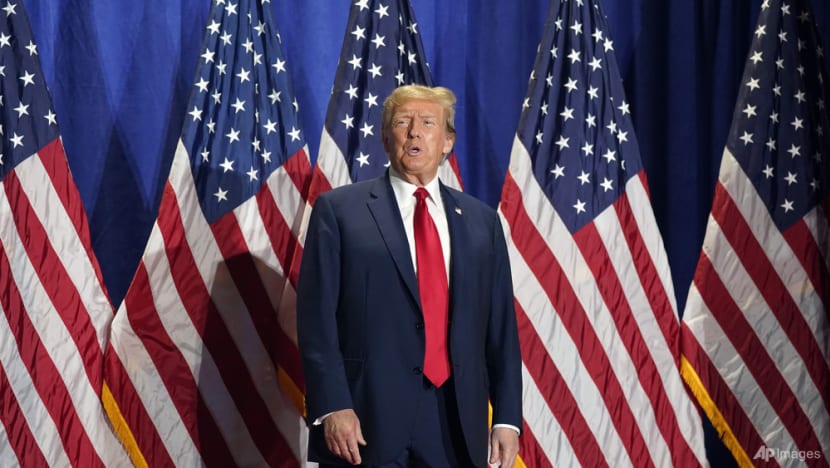Analysis: As a Biden-Trump presidential rematch looms, who might China prefer as the winner and why?
Regardless of who wins the US presidential race, observers say China has certain core interests it expects America’s next leader to continue respecting.


This audio is generated by an AI tool.
- China is fully aware that an American drive to contain it will likely continue regardless of who emerges victorious in the US presidential election, say analysts
- Observers see Mr Biden keeping up the pressure through bilateral action and regional partnerships, while Mr Trump will provide a unilateral and unpredictable turn
- While China won’t make known its preferred pick, analysts believe Beijing favours Mr Trump slightly based on his past actions
- Either way, China will expect America’s next leader to minimally not infringe on its core interests, particularly Taiwan, say experts
SINGAPORE: As the United States marches towards a repeat contest between President Joe Biden and predecessor Donald Trump, China is clear-eyed that regardless of who enters the Oval Office, America’s drive to contain Beijing is all but set to continue, say analysts.
Even so, observers note that how such efforts play out will differ significantly depending on who takes charge of the world’s largest economy, with Mr Biden set to continue leaning on current measures and regional partnerships, while Mr Trump is likely to go at it unilaterally and unpredictably.
While China’s preference is shrouded in secrecy, analysts believe it could be leaning slightly towards Mr Trump, especially considering how Beijing is now armed with experience in how both men operate, having experienced both their presidencies.
“I suspect the Chinese leadership prefers a Trump presidency - simply because they believe that Trump will alienate other countries, including the US’ allies and partners,” Professor Donald Low from the Hong Kong University of Science and Technology (HKUST) told CNA.
Either way, what China expects as a baseline from America’s next leader is that issues deemed to be red lines, particularly the notion of Taiwan independence, are not crossed, experts note.
With China also lashing out publicly and accusing the US of trying to suppress its rise, experts warn that it’s a rocky road ahead for the relationship between the two powers.
In a sign of the possible tensions leading up to the US election, Beijing has raised the prospect of retribution after TikTok's potential US ban took a step closer to reality.
LANDMARK PRESIDENTIAL SHOWDOWN
The Nov 5 US presidential election is set to replay the 2020 poll when Mr Biden and Mr Trump faced off for the top job. Mr Biden eventually emerged the victor.
Both men all but confirmed their showdown on Tuesday (Mar 12), crossing the delegates’ threshold to become their parties’ presumptive nominees. This will be the first US presidential rematch since 1956. They will also be the oldest to run for the White House, with Mr Biden and Mr Trump at age 81 and 77 now respectively.
About 39 per cent of registered voters in a week-long Reuters/Ipsos poll which closed on Mar 13 said they would vote for Mr Biden if the election were held today, compared with 38 per cent who picked Mr Trump. The survey polled about 3,300 American adults.
As the marathon eight-month race to the White House kicks off in earnest, the world is watching - and arguably none more so than China, which is smarting from both a Trump and a Biden presidency over the last eight years.
Under Mr Trump’s 2017-2021 presidency, a relatively cordial start with Chinese leaders - with face-to-face meetings on both US and Chinese soil - was quickly shunted aside as the businessman-turned-president accused Beijing of unfair trade practices and eventually imposed tariffs on about US$550 billion worth of Chinese goods.

Beijing’s tit-for-tat response set off a full-blown trade war that hurt consumers and businesses in and beyond the world’s top two economies, with its impact still lingering today, say analysts.
“(Trump) effectively changed the trajectory and tenor of US-China relations into a very competitive one, that has essentially become a structural condition of the relationship,” said China scholar Hoo Tiang Boon from Singapore’s Nanyang Technological University (NTU).
There were expectations Mr Biden would undo most of Mr Trump’s policy actions upon entering office in 2021. Instead, most of the tariffs have been retained.
Beyond that, the US leader has imposed export controls on high-end semiconductors and chipmaking tools to China while encouraging allies to adopt similar curbs.
“Back in 2020, China was probably somewhat optimistic that a Biden presidency would seek to mend trade relations between the two countries, and maybe scale back some of the Trump-era tariffs. This time around, they aren’t under any such illusions,” HKUST’s Prof Low told CNA.
CONSENSUS ON CONTAINING CHINA
Indeed, analysts say Mr Biden and Mr Trump are broadly aligned on China even as they take swipes at each other during the campaign trail.
“Containing China is the only common view of both the Republican Party and the Democratic Party,” said Jamestown Foundation senior China fellow Willy Lam, referring to the political parties of Mr Trump and Mr Biden respectively.
Both men have already amped up the rhetoric.
Mr Biden has proclaimed that the US is in pole position to “win the competition for the 21st century against China or anyone else”, while Mr Trump has pledged to get tough with tariffs again if elected, floating duties upward of 60 per cent on Chinese goods. US tariffs on imports from China are at 19.3 per cent on average, according to a South China Morning Post report in January.
The tough talk by both contenders is only expected to continue as the polls draw closer, analysts note.
“China has already accepted reluctantly that demonisation of China will be par for the course for both American presidential candidates,” Dr Hoo, an associate professor at NTU’s School of Social Sciences, told CNA.
Against this backdrop, analysts say regardless of who enters the Oval Office, the crosshairs of that administration will be trained on containing China. The distinction lies in how this will be carried out, they note.
“If re-elected, Biden will continue trying to cut China off from the global high-tech supply chain,” said Mr Lam, who specialises in China politics and also comments on Sino-US relations.
Efforts to relocate American supply chains outside China as part of a so-called de-risking strategy would likely continue under a second Biden term as well, analysts say.
Expected to stand firm too under a Biden administration would be regional alliances like the Quad partnership and AUKUS, observers note.
Beijing made clear its frustrations at Washington’s manoeuvres during its recent annual political meetings, known as the two sessions.
“The US has been devising various tactics to suppress and contain China and keeps lengthening its unilateral sanctions list, reaching bewildering levels of unfathomable absurdity,” Chinese Foreign Minister Wang Yi said at a meet-the-press event on Mar 7.
“If it gets jittery whenever it hears the word China, where is its confidence as a major country?”
Under Mr Trump, the US containment strategy against China will take a markedly different turn, note analysts, especially if actions taken under his presidency are anything to go by.
The US is likely to act more unilaterally under Mr Trump, Prof Low from HKUST told CNA.
The US pulled out of numerous international pacts and organisations under Mr Trump’s presidency. Among them were the Trans-Pacific Partnership, the World Health Organization and the Paris Climate Agreement.
Prof Low brought up the Indo-Pacific Economic Framework for Prosperity (IPEF), launched by the Biden administration two years ago. The US-led economic initiative has seven Southeast Asian nations among its ranks and is largely seen as a regional bulwark to China’s Belt and Road Initiative.
“I do not expect the IPEF to survive under a Trump presidency,” said Prof Low.

At the same time, observers note that it’s anyone’s guess what Mr Trump might do.
Mr Trump likes “dramatic, unpredictable, and headline-catching moves”, said Mr Lam, referring to the abrupt closure of the Chinese consulate in Houston and the curtailing of US visas for would-be PhD candidates from China in 2020.
PRESIDENTIAL PREFERENCE?
China is not expected to publicly state or even allude to who it wants as America’s next leader, observers note, because it does not want to be accused of interference in the US election.
Chinese Foreign Ministry spokesperson Wang Wenbin said at a press briefing on Wednesday (Mar 13) that the US presidential election is the US’ internal affairs.
“No matter who is elected the next US president, we hope that the US side will work with China to meet each other halfway and push China-US relations toward a steady, healthy and sustainable development based on the principles of mutual respect, peaceful co-existence and win-win cooperation,” he added.
But this doesn’t mean Beijing is neutral between Mr Biden and Mr Trump, analysts point out.
Meanwhile, Chinese scholars have alluded to the dilemma facing the Chinese leadership.
“For China, no matter who won the US presidential election, they would be two ‘bowls of poison’ (liang wan du wan in Chinese)," said international relations professor Zhao Minghao at Fudan University in Shanghai as reported by the Associated Press in late January.
This was picked up in a Feb 1 op-ed by state-run Global Times. "(The metaphor) encapsulates a critical viewpoint across the Pacific: the policies of both Biden and Trump toward China are seen not just as unfavourable but as inherently detrimental. The only difference lies in the degree of toxicity," the article stated.
NTU’s Dr Hoo told CNA: “From China’s point of view, it’s basically like asking them to choose between a rock and a hard place."
On Mr Biden, a key concern for China is how he has brought together “essentially the West and like-minded allies” to curtail China’s development, Dr Hoo added.
The US leader’s negative portrayals of China and President Xi Jinping have also irked Beijing, he added, referring to how Mr Biden described Mr Xi as a “dictator” on several occasions.
In contrast, Mr Trump has praised Mr Xi multiple times, both during his presidency and after, using words such as "brilliant" and "gentleman". He has also praised controversial leaders such as North Korea's Kim Jong Un, Hungary's Viktor Orban and Russia's Vladimir Putin.
Still, Dr Hoo believes a second Biden presidency would offer some degree of “continuity and predictability” to China.
“He talks about having established some kind of guardrails in US-China competition … so at least from China’s point of view, there is some degree of assurance that there is some limit to how bad the relationship could get," Dr Hoo added.
Related:
Under Mr Trump, this floor in the bilateral relationship will be in question due to his relative unpredictability, observers say. The return of Mr Trump could also portend the prospect of a full-fledged trade war.
But there could be a silver lining for Beijing with Mr Trump likely to continue pursuing an “America First” isolationist foreign policy, observers note.
“This would likely result in a greater degree of incoherency and disunity with regards to Western pressure on China,” said Dr Hoo.
Under Mr Trump, the US will continue to put pressure on China and do so more overtly, HKUST’s Prof Low told CNA.
“But it will do so in less competent ways, and in ways that make it difficult for other countries to follow the US’ lead,” he added. Because of this reason, Prof Low suspects the Chinese leadership favours a Trump presidency.
A Trump presidency could potentially allow China to gain more international sway, analysts note.
Taking the grinding Russia-Ukraine war as an example, Prof Low believes a Trump administration would be unwilling to back Kyiv in resisting Moscow. This would make a Chinese-brokered peace deal more likely, bolstering China's reputation among much of the Global South, Prof Low added.
In a past example, the US pulled out of the Trans-Pacific Partnership (TPP) trade pact in 2017 during Mr Trump's presidency.
Fast forward to now and the world's largest economy is absent from the TPP's successor Comprehensive and Progressive Trans-Pacific Partnership (CPTPP), while also left out of the Regional Comprehensive Economic Partnership, the world's biggest trade deal involving China and other of Asia's largest economies.
Mr Trump represents a “faint prospect” to China that he may reverse Mr Biden’s course, Dr Hoo said. At the same time, he stressed that Beijing is “certainly not optimistic” about Mr Trump, considering his past actions.
Aside from sparking a trade war with China during his presidency, Mr Trump also blamed the pandemic on Beijing and pushed unverified claims that COVID-19 could have originated in a Chinese lab.
“There was a lot of negative press on China; all these were fanned by the rhetoric of Trump … by the time of the (2020) election, China had already gone sour on Trump,” Dr Hoo told CNA.
TOEING THE LINE
Regardless of who comes up tops in the US presidential race, experts agree that China will expect America’s next leader not to infringe on what it deems its core interests.
In 2021, China laid out three so-called “bottom lines” or “di xian” in Chinese regarding bilateral relations with the US.
“The US must not challenge, slander or even attempt to subvert the path and system of socialism with Chinese characteristics”, Foreign Minister Wang said during a meeting with US Deputy Secretary of State Wendy Sherman in Tianjin.
He added that the US must also not attempt to obstruct or interrupt China's development process, nor infringe on China's state sovereignty or damage its territorial integrity, with the last viewed as a veiled warning over Taiwan.
While China’s bottom lines are “quite ambiguous” and are also evolving, one that has been made “quite explicit and clear” is that relating to Taiwan, Dr Hoo noted.
China considers the self-ruled island as an inalienable part of its territory, Beijing has repeatedly underscored that it will not tolerate any internal or external attempts towards Taiwan independence.
The Chinese leadership have framed the issue as “the bedrock of the political foundation of China-US relations”, and the “first red line” that must not be crossed in bilateral ties.
“Whoever is the next US president, the Chinese would expect that president and his administration to pay great attention to Chinese core interests on Taiwan,” said Dr Hoo.
“Definitely they do not expect any American administration to support Taiwan independence because if they were to do so, the risk of conflict - both with China and Taiwan, and between China and the US - would certainly escalate.”
BRACING FOR A ROCKY ROAD
Either way, a rocky road lies ahead for US-China relations even after the US presidential election comes and goes in November, analysts say.
The Chinese leadership knows that there is a fairly high degree of bipartisan consensus in the US that views China as a strategic competitor, if not an outright threat to American interests globally, HKUST’s Prof Low told CNA.
“Whether it’s a second Biden presidency or a second Trump presidency, this consensus is unlikely to fray.”
The strength of Beijing's response to Washington under America's next president hinges on how aggressively the US takes action in areas such as the economy, security and regional influence, analysts note. Also, how much China deems these moves as a threat to its growth and national security is another factor.
The Jamestown Foundation’s Mr Lam believes how China’s economy performs will be key in shaping the US-China relationship over the next few years.
“Washington is very keen to widen the gap and reduce China’s possibility of catching up with either the US economy or tech dominance,” said Mr Lam. He pointed out how US tech giants have all announced “multi-billion, even multi-trillion-dollar investments” in AI and like-minded areas.
NTU’s Dr Hoo said the dynamics of the bilateral relationship have fundamentally shifted from varying degrees of cooperation to overwhelming competition, something China is well aware of.
“Essentially the relationship has turned into an adversarial and competitive one, and it has become a structural condition,” he added.
“Of course (China) hopes ties will improve … but I don’t think they have great expectations on that.”



















